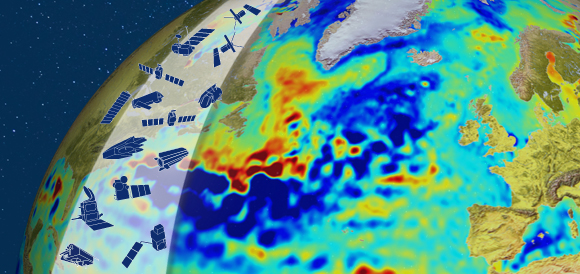A seminal article on the progress of satellite altimetry and its future has been published on-line in Advances in Space Research on 23 March 2021. It is authored by the International Altimetry Team, which is composed of more than 360 co-authors.
In 2018, in Ponta Delgada, the Azores, Portugal, celebrations took place for 25 years of development of radar altimetry, and the progress achieved by this methodology in the fields of global and coastal oceanography, hydrology, geodesy and cryospheric sciences. On this occasion it was decided to collect contributions of scientists, engineers and managers involved in the worldwide altimetry community to depict the state of altimetry and propose recommendations for the altimetry of the future.
The article provides guidance for future mission design, research activities, and sustainable operational radar altimetry data exploitation. The article ranges from scientific results to applications highlights to instruments and missions, data and methods up to capacity building and programmatic elements.
Last but not least, the article gathers recommendations for facing new challenges and optimising further scientific and operational advances of oceanographic observations by altimetry, including requirements for spatial and temporal resolution of altimetric measurements, their accuracy and continuity.
Read and download the full article, which is published as open access.
Please cite this article as: International Altimetry Team (2021) Altimetry for the future: Building on 25 years of progress, Advances in Space Research, https://doi.org/10.1016/j.asr.2021.01.022
This article is part of a Special Issue of Advances in Space Research encompassing 57 articles organised into ten sections on Ocean Dynamics, Sea Level, Coastal Ocean, Hydrology, Cryosphere and Polar Oceans, Applications, Development of new instruments and processing algorithms, Key Observations, Data and Methods and Education and Training, which will be issued as Volume 68, Issue 2 on 15 July 2021. The Preface of this Special Issue is also on-line at https://doi.org/10.1016/j.asr.2021.01.020 as well as all the articles.

